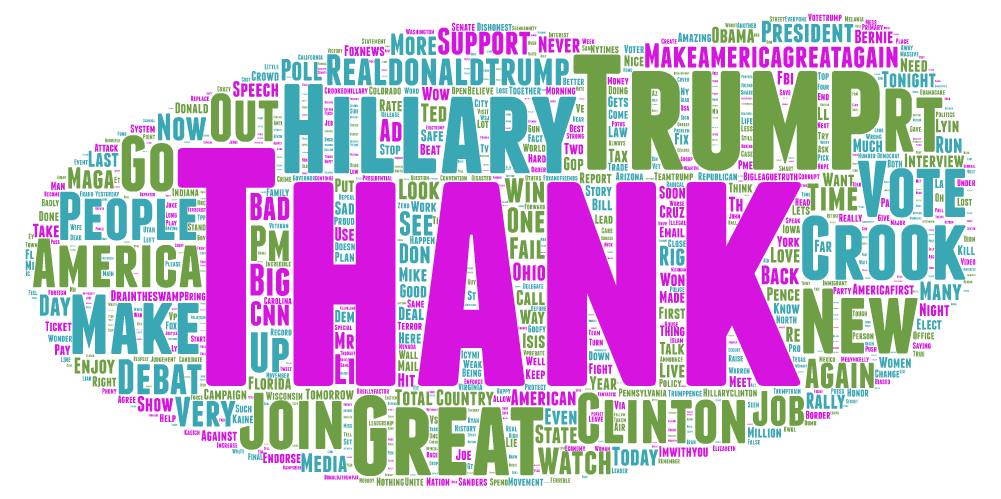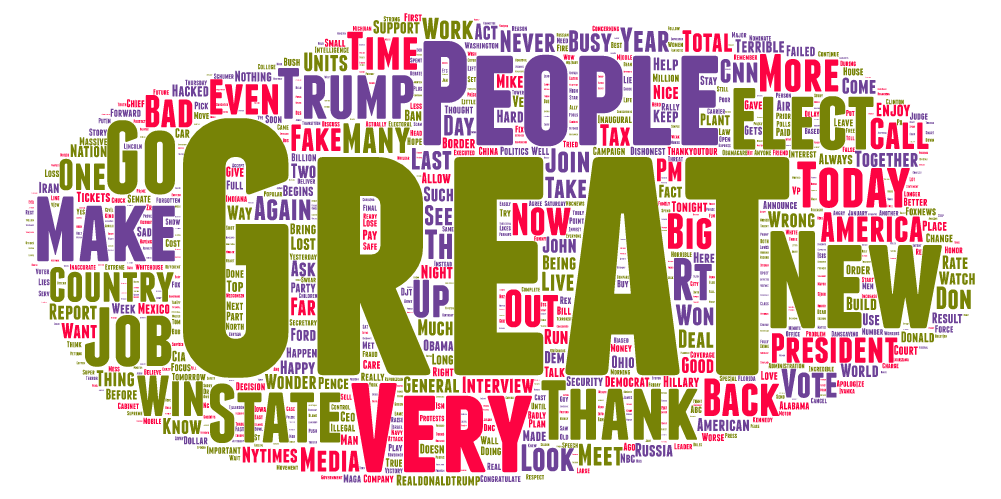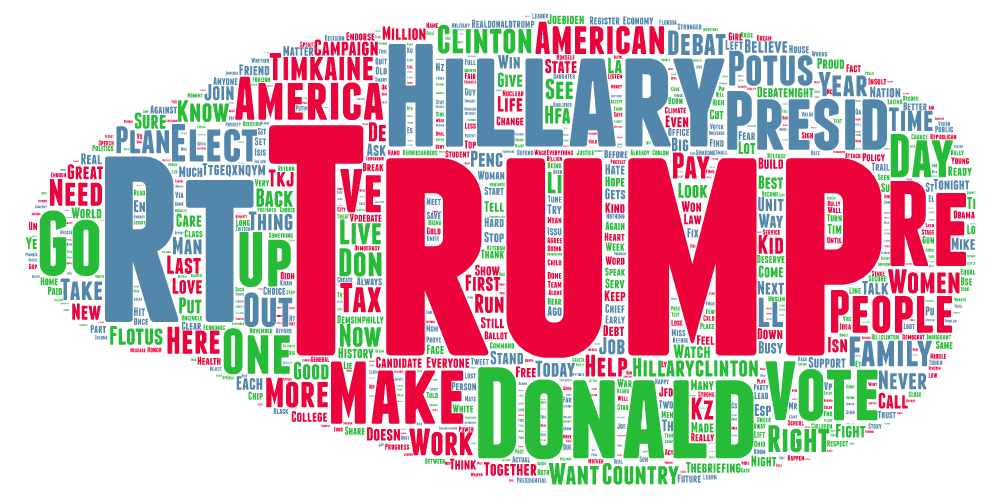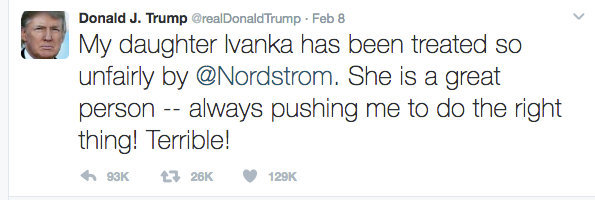Donald Trump is not exactly known for his sunny personality. Yet, surprisingly, his tweets may have appeared more positive than Hillary Clinton’s.
A simple textual analysis may provide some insight into why Trump’s use of social media appears to be so effective, at least among his followers, and a window into why Clinton’s campaign failed. To do this, I downloaded the most recent 3200 tweets from Donald Trump and Hillary Clinton and created word clouds in which the size of a word in the cloud indicates its frequency.[1]
The analysis (or, perhaps more accurately, graphic) shows that the words Trump uses in his tweets tend to be positive ones. By contrast, Clinton’s most common tweets seemed to be about Trump, without the positive words.
More specifically, before the election Trump’s most commonly used the word “thank,” and after the election “great.” In addition to “great,” his common words included “join,” “America,” and “people.” Not all Trump’s words were positive, of course. He frequently tweeted the words “Hillary,” Clinton,” and “Crook,” certainly all in a negative context.
Word Cloud of Trump Tweets Before the Election

After the election, Trump’s most commonly-used words were “great,” “people,” new,” “very,” and “thank.
Word Cloud of Trump Tweet After Election

Clinton’s most common word before the election was “Trump,” followed by “Hillary,” “Donald,” “vote,” and “America” or “American.” This word cloud is consistent with criticisms that the Clinton campaign focused on Trump to the exclusion of a coherent theme. It is possible to see references to her causes, like “people,” “family,” and “women,” but those are far down the list compared to “Trump” and “Donald.”
Word Cloud of Clinton Tweets Before the Election

This little ad-hoc analysis has some problems, of course. It looks at individual words, not phrases or context. “Thank” by itself sounds positive, but could have been paired with “I will never thank that moron” (it wasn’t).
Additionally, the tone of an entire tweet may be different than the individual words suggest. One example of tone versus words is Trump’s recent tweet about his daughter and Nordstrom. The tweet has the word “great,” but few would say that this tweet is positive.

A far more sophisticated textual analysis by David Robinson [2] found that Trump’s more positive tweets came from an iPhone, more negative tweets from an Android device, and that different people post from the different devices. This difference led to the conclusion that tweets directly by Trump, who uses a Samsung Galaxy, were more negative than tweets from his staff. The simple word clouds in this post do not cast doubt on that conclusion. But they suggest that consumers of his tweets tend to see these positive words fairly frequently, despite the different leanings of the posters.
It is conceivable, however, that the particular words used, in addition to the message or tone, of the tweet matter. Some evidence suggests that people scan, rather than read, text online. If that is the case then many people may take in only a few words from the tweet, implying that a negative tweet that uses positive-sounding words like “great” might be viewed positively (and vice-versa).
The role of social media, including tweets, in the 2016 election will continue to be subjected to much more rigorous examination. Still, this analysis leads to the somewhat surprising conclusion that Trump tends to use words that generally have a positive connotation and to the somewhat less surprising conclusion that the Clinton team was less able to be positive or focus on issues other than her opponent.
[1] And by “I,” I mean TPI’s intrepid research associate, Brandon Silberstein.
[2] Props where props are due. I made some nice pictures. He analyzed the text.
Notes:
Word clouds generated by tagul.com.
For the clouds we excluded the following words: the, in, of, a, and, for, to, &, are, an, it, these, those, that, that’s, over, is, am, if, it’s, this, by, can, but, as.
Scott Wallsten is President and Senior Fellow at the Technology Policy Institute and also a senior fellow at the Georgetown Center for Business and Public Policy. He is an economist with expertise in industrial organization and public policy, and his research focuses on competition, regulation, telecommunications, the economics of digitization, and technology policy. He was the economics director for the FCC's National Broadband Plan and has been a lecturer in Stanford University’s public policy program, director of communications policy studies and senior fellow at the Progress & Freedom Foundation, a senior fellow at the AEI – Brookings Joint Center for Regulatory Studies and a resident scholar at the American Enterprise Institute, an economist at The World Bank, a scholar at the Stanford Institute for Economic Policy Research, and a staff economist at the U.S. President’s Council of Economic Advisers. He holds a PhD in economics from Stanford University.


